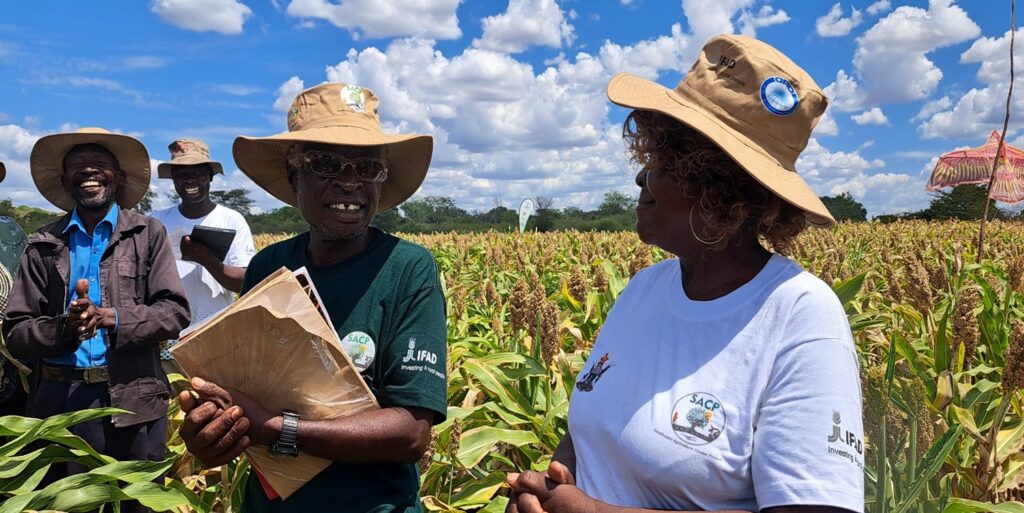Hwange farmers food secure after adopting traditional grains
.A Hwange couple, Mr. Robert and Mrs. Maria Dube, are food secure after heeding the call from the Government to plant traditional grains and adopting improved seed varieties. The couple participated in a demonstration facilitated by the Smallholder Agriculture Cluster Project (SACP) and emerged as a shining example of the benefits of following extension officers’ advice to plant crops suitable for their agro-ecological region. They cultivated three Pfumvudza plots and planted the Macia variety of sorghum, known for its superior drought resistance and nutritional value.
In April this year, the couple hosted a field day to showcase their thriving sorghum crop. The event, themed “Promoting resilience and improved nutrition through the adoption of climate-smart value chains,” began with a series of presentations by the Dube family. In the demonstration plot, Mr. Dube outlined the various steps they undertook to achieve such impressive results, especially in contrast to other crops in the area that had failed due to the devastating El Niño-induced drought, which the government described as the worst in the past 40 years.
Addressing stakeholders, including government officials, traditional leaders, farmers, and the media, Mr. Dube shared, “When the season started, we initially planted some maize, but due to prolonged dry spells, it was a complete write-off. That’s when we decided to try traditional grains after receiving training from SACP. By switching to the Marcia variety of sorghum and utilizing improved seeds, my family and I are now food secure. I encourage all farmers to heed the advice of extension officers; this will ultimately help us achieve greater food security, especially in these semi-arid areas facing challenges compounded by the El Niño-induced drought.”
The Dube family combined conservation agriculture practices with innovative technologies, such as hydrogel, which retains moisture and releases it to crops during dry spells. From one of their three plots, they harvested an impressive 0.37 tonnes of sorghum, underscoring the effectiveness of their approach. Chief Shana, who attended the field day, praised the couple for adopting climate-smart initiatives from SACP. He noted, “I can see that this farmer listened attentively to all the training he received from SACP. His commitment to applying the knowledge gained will greatly benefit my community. I will task him to share his experiences with farmers in eight other villages, encouraging them to adopt the practices the Ministry of Agriculture has been promoting. This will enhance food and nutrition security in our area.”
Matabeleland North Provincial Director, Mr. Dumisani Mbikwa Nyoni, encouraged farmers in the province to heed the Government’s call to grow traditional grains. He stated, “The changing climatic conditions, including recurrent droughts, shifts in the rainy season, poor rainfall distribution, and long mid-season dry spells, have made maize cultivation in semi-arid regions like Matabeleland North increasingly risky. Therefore, it is crucial for farmers to embrace traditional grains and improved seed varieties that can withstand these challenges.”
SACP National Project Coordinator, Dr. Godfrey Nehanda, who was the guest of honor, reiterated the project’s commitment to promoting the traditional grains value chain. He added that this was being achieved by organizing farmers into clusters and connecting them with off-takers. Sorghum is a key value chain being promoted as part of the six value chains within the project.


Spectecular, this is the only mitigatory measure to curb hunger as we face these Elnino induced droughts thus small grains
Food security everyday everywhere !! With traditional grains you will not go wrong , thumbs up team Hwange for promoting Climate Smart Agriculture adoption
It’s quite encouraging as the results are clear. Let’s do more of these demonstrations as they have real impact in changing other famers ‘s minds and adopt small grains as staple food crop.
Fine way of describing, and nice paragraph
to get information regarding my presentation focus, which i am going to deliver in school.
my web page: youtube downloader